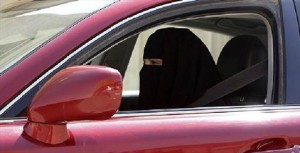 RIYADH, Saudi Arabia (AP) � It's only for women over 30, who must be off the road by 8 p.m. and cannot wear makeup behind the wheel. But it's still a startling shift.
RIYADH, Saudi Arabia (AP) � It's only for women over 30, who must be off the road by 8 p.m. and cannot wear makeup behind the wheel. But it's still a startling shift.The Saudi king's advisory council has recommended that the government lift its ban on female drivers, a member of the council told The Associated Press Friday.
The Shura Council's recommendations are not obligatory on the government, but simply making the recommendation was a major step after years of the kingdom staunchly rejecting any review of the ban.
There have been small but increasingly bold protests by women who took to their cars over the past year. The driving ban, which is unique in the world, is imposed because the kingdom's ultraconservative Muslim clerics say "licentiousness" will spread if women drive.
The council member said the Shura Council made the recommendations in a secret, closed session held in the past month. The member spoke on condition of anonymity because the recommendations had not been made public.
Under the recommendations, only women over 30 would be allowed to drive and they would need permission from a male relative � usually a husband or father, but lacking those, a brother or son. They would be allowed to drive from 7 a.m. to 8 p.m. on Saturday through Wednesday and noon to 8 p.m. on Thursday and Friday. It wasn't immediately clear why the restrictions would be different Thursday and Friday, as the Saudi weekend was changed by royal decree in 2013 to Friday and Saturday.
The conditions also require that a woman driver wear conservative dress and no make-up, the official said. Within cities, they can drive without a male relative in the car, but outside of cities, a male is required to be present.
The council said a "female traffic department" would have to be created to deal with female drivers if their cars broke down or they encountered other problems, and to issue fines. It recommended the female traffic officers be under the supervision of the "religious agencies."
The council placed heavy restrictions on interactions between female drivers and male traffic officers or other male drivers, and stiff penalties for those who broke them. Merely speaking to a female driver, it said, was punishable by a one-month prison sentence and a fine.
The 150-member Shura Council is appointed by the king, drawing on various sectors of society to act as the closest thing to a parliament in the kingdom, though it has no legislative powers. King Abdullah appointed women to it for the first time, and now there are 30 female members.
The driving ban has long forced families to hire live-in drivers for women. Women who can't afford the $300 to $400 a month for a driver must rely on male relatives to drive them to work, school, shopping or the doctor.
The ban is part of the general restrictions imposed on women based on the strict interpretation of Islamic Shariah law known as Wahhabism. Genders are strictly segregated, and women are required to wear a headscarf and loose, black robes in public. Guardianship laws require women to get permission from a male relative to travel, get married, enroll in higher education or undergo certain surgical procedures.
Female activists launched their latest campaign to defy the driving ban on Oct. 26, when dozens of women drove around their neighborhoods and posted video clips of themselves driving on social networking sites.
The campaign prompted authorities to issue a statement warning violators would be dealt with firmly. Saudi Arabia has no written law barring women from driving � only fatwas, or religious edicts, by senior clerics.
Campaigns to overturn the driving ban have been going on for decades.
During the first major protest, in 1990, around 50 women drove. They were jailed for a day, had their passports confiscated and lost their jobs. Their male relatives were also barred from traveling for six months.
In June 2011, about 40 women got behind the wheel in a protest sparked when a woman was arrested after posting a video of herself driving. One woman was later arrested and sentenced to 10 lashes, a penalty the king overturned.
By The Associated Press
The Iran Project is not responsible for the content of quoted articles.










